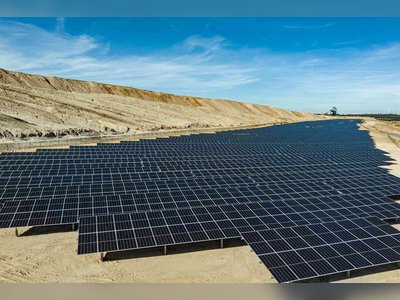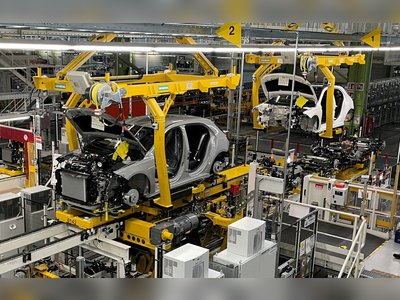
Electric Vehicle Registrations Surge in Germany Amid Price Discounts
Increased demand for electric vehicles in April attributed to rising discounts and tax incentives, while Tesla faces declining sales.
The German electric vehicle (EV) market has witnessed a significant resurgence, with new registrations increasing by over 50% in April 2025. According to the Kraftfahrt-Bundesamt (KBA), more than 45,500 fully battery-powered cars were registered last month, marking nearly a 54% rise compared to the same month the previous year.
Approximately 18.8% of all new vehicles registered in Germany last month were electric, highlighting a shift towards EV adoption.
This surge in demand is largely driven by higher price discounts on electric vehicles.
An analysis by industry expert Ferdinand Dudenhöffer indicated that average discounts in April reached 16.7%, up by 1.8 percentage points from March.
Since January, these discounts have increased by three percentage points, amounting to more than €1,000 on typical models.
Business users have particularly benefitted from these price reductions, as the favorable taxation of electric company cars serves as an incentive for businesses to transition to electric vehicles.
Constantin Gall from consultancy firm EY noted that while the environmental bonus has been phased out in Germany, the tax advantages for electric fleet vehicles significantly encourage their adoption among companies.
The price reductions have been prompted by European Union CO2 regulations, which aim to increase the sales of electric vehicles, along with shifts in the distribution strategy of certain manufacturers.
Dudenhöffer highlighted that stronger marketing efforts through dealers are being implemented in response to previous weak demand, as manufacturers strive to invigorate the market.
Despite the recent uptick in registrations, overall vehicle sales in Germany remained stagnant.
The total number of new vehicle registrations across all drivetrains was approximately 242,700, representing a 0.2% decline compared to April 2024.
However, the performance of several established German automakers has improved, previously affected by the end of state subsidies for electric vehicles.
Experts like Dudenhöffer suggest that the market could be poised for a new upswing driven by more competitive pricing.
Notably, Tesla's position in the German market contrasts with this general trend.
The US automaker, which operates a significant factory in Grünheide, Brandenburg, reported a 45% decline in new car registrations for April compared to the previous year.
Factors contributing to this downturn include a growing consumer boycott related to the company's leadership and its association with controversial political stances.
As the landscape of electric vehicle adoption continues to evolve in Germany, the market dynamics are becoming increasingly complex, marked by shifts in consumer preferences, regulatory pressures, and competitive pricing strategies.
Approximately 18.8% of all new vehicles registered in Germany last month were electric, highlighting a shift towards EV adoption.
This surge in demand is largely driven by higher price discounts on electric vehicles.
An analysis by industry expert Ferdinand Dudenhöffer indicated that average discounts in April reached 16.7%, up by 1.8 percentage points from March.
Since January, these discounts have increased by three percentage points, amounting to more than €1,000 on typical models.
Business users have particularly benefitted from these price reductions, as the favorable taxation of electric company cars serves as an incentive for businesses to transition to electric vehicles.
Constantin Gall from consultancy firm EY noted that while the environmental bonus has been phased out in Germany, the tax advantages for electric fleet vehicles significantly encourage their adoption among companies.
The price reductions have been prompted by European Union CO2 regulations, which aim to increase the sales of electric vehicles, along with shifts in the distribution strategy of certain manufacturers.
Dudenhöffer highlighted that stronger marketing efforts through dealers are being implemented in response to previous weak demand, as manufacturers strive to invigorate the market.
Despite the recent uptick in registrations, overall vehicle sales in Germany remained stagnant.
The total number of new vehicle registrations across all drivetrains was approximately 242,700, representing a 0.2% decline compared to April 2024.
However, the performance of several established German automakers has improved, previously affected by the end of state subsidies for electric vehicles.
Experts like Dudenhöffer suggest that the market could be poised for a new upswing driven by more competitive pricing.
Notably, Tesla's position in the German market contrasts with this general trend.
The US automaker, which operates a significant factory in Grünheide, Brandenburg, reported a 45% decline in new car registrations for April compared to the previous year.
Factors contributing to this downturn include a growing consumer boycott related to the company's leadership and its association with controversial political stances.
As the landscape of electric vehicle adoption continues to evolve in Germany, the market dynamics are becoming increasingly complex, marked by shifts in consumer preferences, regulatory pressures, and competitive pricing strategies.
Translation:
Translated by AI
AI Disclaimer: An advanced artificial intelligence (AI) system generated the content of this page on its own. This innovative technology conducts extensive research from a variety of reliable sources, performs rigorous fact-checking and verification, cleans up and balances biased or manipulated content, and presents a minimal factual summary that is just enough yet essential for you to function as an informed and educated citizen. Please keep in mind, however, that this system is an evolving technology, and as a result, the article may contain accidental inaccuracies or errors. We urge you to help us improve our site by reporting any inaccuracies you find using the "Contact Us" link at the bottom of this page. Your helpful feedback helps us improve our system and deliver more precise content. When you find an article of interest here, please look for the full and extensive coverage of this topic in traditional news sources, as they are written by professional journalists that we try to support, not replace. We appreciate your understanding and assistance.











